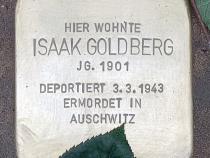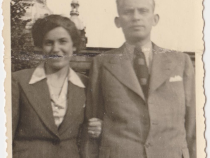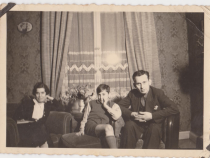Isaak Goldberg
Isaak was born Icek Goldberg in Sulejów, Poland on 26th February 1901 at 11pm. His mother, Maria Fradjla Choinska originated from Piotrków Trybunalski and was 38 years old when he was born. Icek’s father was Szlama Goldberg, a tailor, who came from Sulejów and was 35 years old at the time of Icek’s birth. Two years later Icek was joined by his brother Josek Berek born on 12th September 1903 but the two may have had older siblings as well.
The origins of Sulejów go back to a village founded near the crossing of the Pilica River in the 12th century but by 1815 it had become part of the Russian partition of Poland. During the January Uprising Polish insurgents and Russian troops clashed in Sulejów and as a result, in 1870, the town was punished by being deprived of its town rights. After the first World War, in 1918, Poland regained its independence and thus control of Sulejów with its town rights being restored in 1927. At the time Icek was born the local economy was becoming rejuvenated as Sulejów had become an important centre of the limestone and wood industry, supplying building materials to Łódź, and benefitting from the wider markets created by the opening of the narrow-gauge railway between Piotrków Trybunalski and Sulejów.
With Polish independence came the requirement for young men to join the Polish Army as it was fighting wars on many fronts. Icek did not want to do this so in around 1921 he moved to Berlin; a move that resulted in him being declared “stateless”. In Berlin Icek (now known as Isaak) met Lieba Scheindla Ullmann and they were married by Jewish Rites in about 1924. They couldn’t have a civil ceremony at the time as Isaak didn’t have the necessary papers as a result of his stateless status. The couple first lived at Prenzlauer Strasse 4, with Gotthilf Goldberg, possibly a relative of Isaak, and the following year, on 23rd November 1925, their only child Arnold was born in the Friedrichshain Krankenhaus.
Although illiterate, Isaak had a good business brain and was brilliant at Maths. When Arnold was about 5 years old Isaak moved his family to Paul Singer Strasse 1 later known as Brauner Weg 1, where he supported everyone by running a shoemaking and repair business from a workshop in the basement, whilst the family lived in an apartment behind the workshop. Arnold went to a local Jewish Community school in a building that also housed an independent Synagogue and his mother, Lieba, took on some temporary jobs to help the family finances. The family were happy living there surrounded by family who they visited regularly. For much of the time Lieba’s mother, Sara Ryfka Ullmann lived with them.
This situation continued, but as life became more difficult for Jewish people following the introduction of the Nuremburg laws in 1935, Isaak tried to emigrate with his family. He applied to go to Palestine, Shanghai and even Argentina but as he was stateless every application was refused. Along with some friends, Isaak even tried to cross the border into Belgium but was sent back, fortunately without being imprisoned. As a result of Kristallnacht on 9th November 1938 Isaak and Lieba decided that Arnold should leave on the Kindertransport, which saw him depart Berlin on the 4th Kindertransport on 4th January 1939. After the war started Isaak and Lieba remained living at Brauner Weg 1 and Isaak continued with his shoemaking business although it was now “fronted” by an “Aryan” friend. Once war had started Isaak and Lieba were able to have a civil wedding and they married on 24th May 1940 in Berlin Mitte
Life continued in this way with Arnold receiving regular communications from his parents firstly by regular letters then later via the Red Cross until March 1943. As Jews, Isaak and Lieba’s rights continued to be eroded until the end of February 1943 when, as a result of the “factory action” requiring all remaining Jews to be deported, they were rounded up on 27th February 1943 and taken to a collection camp. On 3rd March 1943 Isaak and Lieba, along with Lieba’s sister Pesel Majerowicz (known as Paula) were deported on transport 33 to Auschwitz Birkenau. Paula’s husband Robert Majerowicz was also deported to Auschwitz Birkenau the following day.
Arnold Ullmann, Isaak and Lieba’s son, survived the war in exile in England where he remained for the rest of his life until his death in 2020. He married and had two daughters, five grandchildren and four great grandchildren. The fate of the rest of Isaac’s family from Sulejów is unknown although there is a high possibility that they died during the Luftwaffe attack on the town in 1939 or in the Ghettos that Jews were forced to live in.
Lieba, Arnold and Isaak
References
Berlin Address Directories 1799-1970 - Digitale Landesbibliothek Berlin (zlb.de)
Sulejów - Wikipedia
Icek Goldberg - Facts (ancestry.co.uk)
Stumbling Stones in Berlin | Places & Biographies of the Stumbling Stones in Berlin (stolpersteine-berlin.de)
Itzek Goldberg (mappingthelives.org)
Isaak Goldberg
Location
Singerstraße 8
Historical name
Brauner Weg 1
District
Mitte
Stone was laid
05 April 2022
Born
26 February 1901 in Sulejów
Occupation
Schuhmacher
Deportation
on 03 March 1943
to
Auschwitz
Murdered
in Auschwitz






